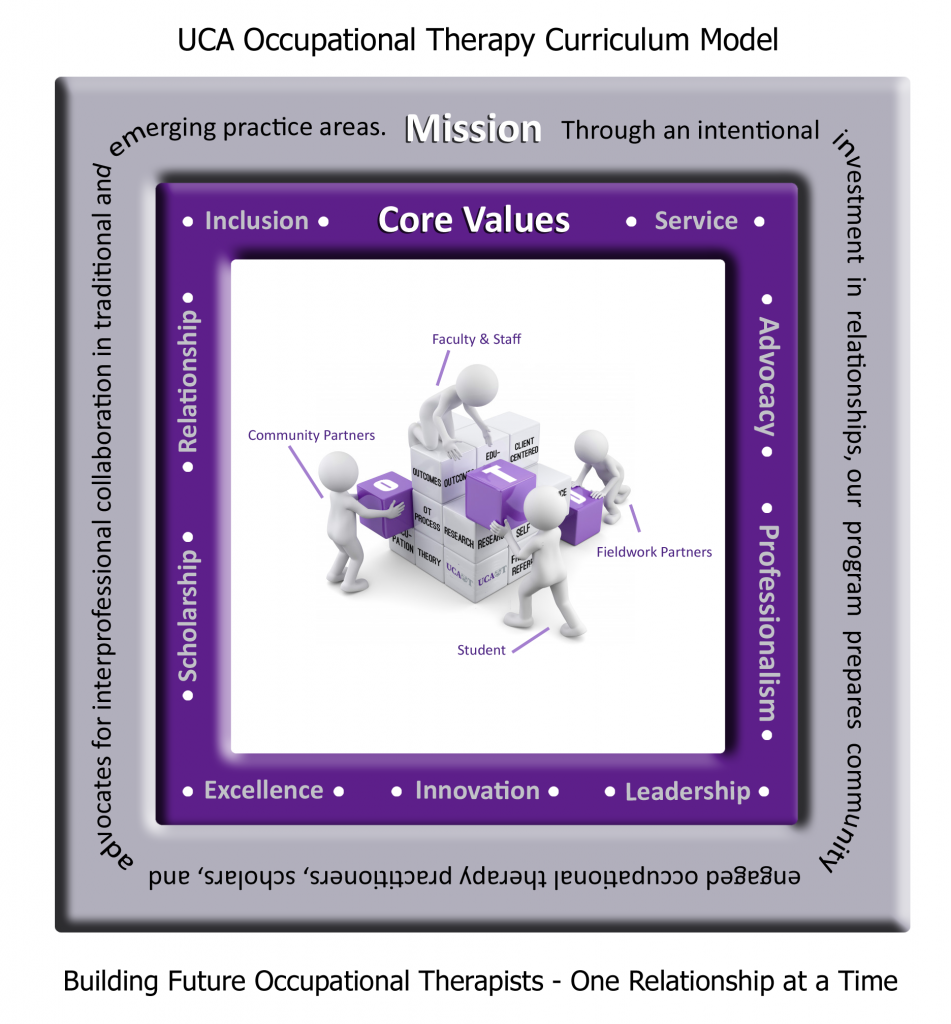CURRICULUM COURSE SEQUENCE
CURRICULUM COURSE DESCRIPTIONS
ESSENTIAL FUNCTIONS
.
ACCREDITATION
The entry-level occupational therapy doctoral degree program is accredited by the Accreditation Council for Occupational Therapy Education (ACOTE) of the American Occupational Therapy Association (AOTA), located at 7501 Wisconsin Avenue, Suite 510E, Bethesda, MD 20814. ACOTE’s telephone number c/o AOTA is (301) 652-AOTA and its web address is www.acoteonline.org.
Graduates of the program will be eligible to sit for the national certification examination for the occupational therapist administered by the National Board for Certification in Occupational Therapy (NBCOT). After successful completion of this exam, the individual will be an Occupational Therapist, Registered (OTR). In addition, all states require licensure in order to practice; however, state licenses are usually based on the results of the NBCOT Certification Examination. See NBCOT’s Important Notes about applying for state licensure and the state-by-state regulatory board contact information linked from the NBCOT page. Note that a felony conviction may affect a graduate’s ability to sit for the NBCOT certification examination or attain state licensure.
For a student to graduate, the student must complete all didactic courses, 24 weeks of Level II fieldwork and a 14-week individual capstone experience and project to demonstrate synthesis and application of knowledge gained. The doctoral capstone must be started after completion of all coursework and Level II fieldwork (2023 ACOTE OTD Standard D.1.3).
VISION
Our vision is to make a positive impact by facilitating occupational participation of diverse people, populations, and communities.
MISSION
Through an intentional investment in relationships, our program prepares community-engaged occupational therapy practitioners, scholars, and advocates for interprofessional collaboration in traditional and emerging practice settings.
CORE VALUES
Advocacy: promotes advocacy of the profession, consumers, and interprofessional community partners.
Scholarship: commits to the goals of lifelong education, as well as the production and the dissemination of knowledge in the humanities, social sciences, and sciences. Scholars are committed to contributing to the development of their field(s) of study and seek to ensure excellence and innovation in occupational therapy.
Service: delivers value to diverse people, populations, and communities by facilitating outcomes service recipients want to achieve.
Professionalism: believes professionalism can be taught and understood over time. The professionalism we desire to model and expect from our students is a collection of traits including ethics, reliability, competence, dependability, integrity, and communication.
Inclusion: honors the inherent value of every individual’s unique story, experience, and perspective by creating a safe and inclusive environment.
Innovation: promotes creativity and innovation in education, practice, and scholarship to achieve professional excellence.
Relationship: prioritizes professional, collaborative, and intentional relationships with community partners, students, and inter/intradisciplinary colleagues.
Excellence: understands that perfection is not readily attainable but aspires to excellence by doing ordinary things extraordinarily well.
Leadership: models innovation leadership by inspiring productive action in faculty and students. We strive to create a departmental climate where individuals apply innovative thinking to solve problems.
COURSE OF STUDY
The curriculum leading to the Doctor of Occupational Therapy requires prior completion of a baccalaureate degree from a USDE- recognized regionally accredited college or university. Moreover, completion of 25 hours of prerequisite course work (grade C or better) is required. Prerequisite courses may be completed at UCA or at another regionally accredited college or university. Students who plan to complete prerequisites at another university are strongly urged to contact the Occupational Therapy Program Advisor to assure course equivalency.
Students are admitted to the program via a competitive admission process. Students who are admitted will complete 115 graduate credit hours, scheduled across a 36 month period. Within the course of study, the students are engaged in both classroom and fieldwork experiences at facilities in Arkansas and across the US. The first level of fieldwork assignments occur in concert with on-campus course work. Advanced levels of fieldwork assignments involve full time placement at two different fieldwork sites across a 6 month period. At this level, students may again be placed at facilities in Arkansas or across the US. In addition, a 560 hour doctoral capstone program will serve as an integral part of the program’s curriculum and will include in-depth experiences in clinical skills, research skills, administration, leadership, program and policy development, advocacy, education, and/or theory development.
Students are responsible for their own transportation and living expenses throughout the program, including fieldwork assignments and doctoral capstone.
For further information, the address and phone number for NBCOT are:
NBCOT
One Bank Street, Suite 300
Gaithersburg, MD 20878
Phone: (301) 990-7979

